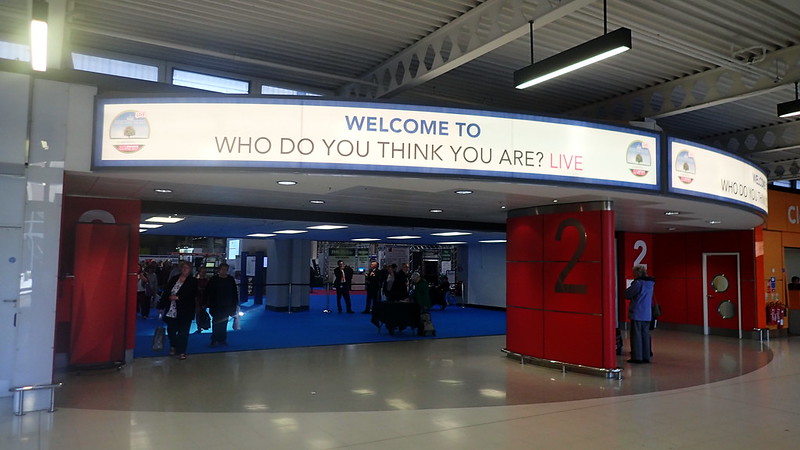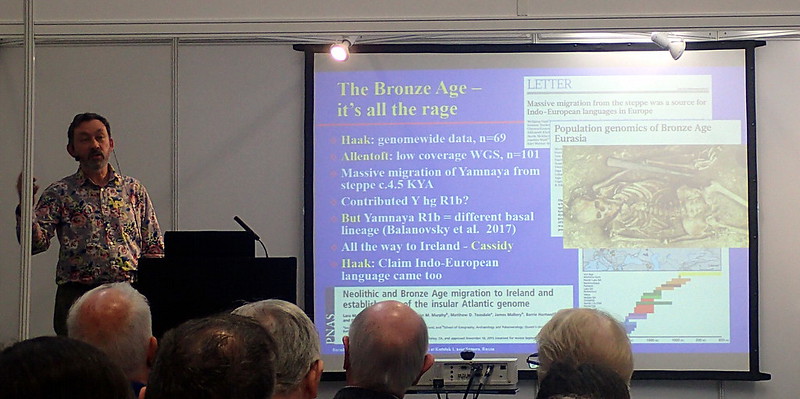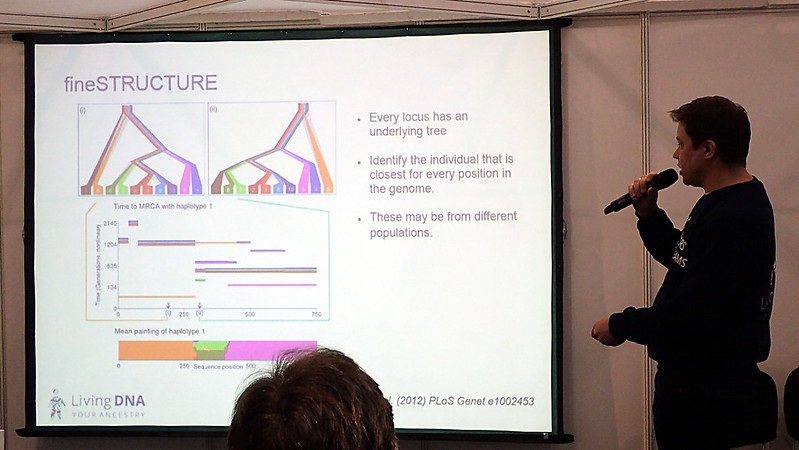
Workshop 1. Total Genealogy. This one was a little disappointing. I hoped that it would combine genealogy with DNA, landscape archaeology, local history, etc. Instead it was surname study - genealogical collecting of all records of a surname and applying it to a database - then trying to work out the connections. Would have benefited if the speaker had also applied Y DNA projects, but I sensed that he was a DNA skeptic. Lots of those in British genealogy, although the number of DNA stalls and workshops clearly suggests that the tide might turn, although it was corporate money funding a lot of it. I say that, but a later speaker suggested that 85% of DNA testers have no or little family tree. They are not all traditional genealogists.
Workshop 2. The Y-DNA and mtDNA Landscape (of Britain).

This was presented by Mark Jobling, Professor of Genetics at Leicester University. He discussed the history of genetic studies of European and British populations, starting with blood types, moving onto STR, a few SNPs, mtDNA, then onto the flood of information over the past few years, including autosomal DNA and POBI (image above).
A few observations - that the Yamnaya R1b is of a different basal lineage, that they found that 1) POBI failed to recognise the Danish contribution to Britain as being ingrained into the Anglo-Saxon - along with later migrations from the Continent, 2) that the Anglo-Saxon event appears male mediated rather like the Steppe signal, and 3) that some British R1a (not all) do look likely to be "Viking". He also said that surprisingly, they had not yet found genetic evidence of Vikings in Ireland in the modern population.
Workshop 3. High Definition Ancestry DNA Testing across the World. This was lead by the Living DNA team. David Nicholson company MD started with the company profile and philosophy. Dr Martin Blythe, their bioinformatician head then took over, followed by Alex Cocker, their anthropologist. Observations that I noted: they are very proud of their fineStructure algorythm, the chip, and of their computation ability. They claim that their system works better at finding shared patterns on admixed populations than do some older systems still used by other companies. Nicholson duruing questions told us that they plan to (and he did state over the next 3 - 5 years for some of the following):
- Complete the three confidence modes (very soon)
- Map Ireland with 13 or 14 sub regions using POBI principles
- Map Germany next with 26 - 28 sub regions
- Map France
- Enrich and fine tune the British data set
- Introduce genetic matching / matches
- Promote inter-company and 3rd party matching
- Introduce parent and relative phasing

Above, Dr Mark Blythe of Living DNA.
Workshop 4. Outside the Law? Illegitimacy 1700 - 1987
This was presented by Professor Rebecca Probert. An interest to myself, but not perhaps of great interest here. It detailed the history of changing legislation towards children born outside of marriage in England & Wales.
Otherwise, I purchased a few Family FHS CD-ROMs, and a few small books. Talked to a number of specialists and FHS members. No exciting discoveries this year, but enough material to feed off for a while. I will just say that I had a lengthy chat with Dr Martin Blythe of Living DNA. I was highly impressed. He was a really nice guy, and clearly loves his job, and is enthusiastic as hell about what he and his company can do in the future. Kudos to him. I saw Debbie Kennett during a part of her workshop, and she would love to chat with her sometime. I've noticed a distant match between two of our kits.
Another great day, loved it.